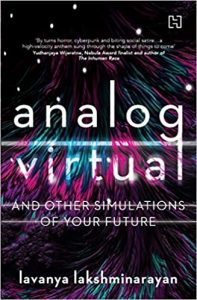Ian Mond Reviews Analog/Virtual: And Other Simulations of Your Future by Lavanya Lakshminarayan
 Analog/Virtual: And Other Simulations of Your Future, Lavanya Lakshminarayan (Hachette India 978-9-389-25308-5, Rs399, 310pp, tp) February 2020.
Analog/Virtual: And Other Simulations of Your Future, Lavanya Lakshminarayan (Hachette India 978-9-389-25308-5, Rs399, 310pp, tp) February 2020.
Having thoroughly enjoyed Lavanya Lakshminarayan’s Analog/Virtual: And Other Simulations of Your Future, I’ve decided that all far-future dystopias should be structured as a series of linked short stories. That’s not to say George Orwell missed a trick by neglecting the perspectives of Julia, Mr. Charrington, or O’Brien; 1984 famously generates its power from how little Winston knows about his world. For those of us who want to understand the mechanics of a society, though, especially one that actively persecutes a good chunk of its citizens, there’s something to broadening the scope, including the voices of the oppressed, the privileged, and those who slot somewhere in between. That’s precisely what Lakshminarayan does with her debut collection, presenting 20 stories told from the viewpoint of the residents of Apex City, where access to technology divides the haves (“Virtuals”) and the have-nots (“Analogs”).
The book opens with “The Ten-Percent Thief”, which deftly establishes the broad aspects of Lakshminarayan’s far-future dystopia. We learn that Apex City, built on the crater that was once Bangalore, is split in two by an electric shield – the Carnatic Meridian – that separates the Analogs from the Virtuals. On the Virtual side, technology informs a person’s life, whether it’s enjoying the pop-culture distractions afforded by HoloTech or protection from a climate ravaged environment by the SunShield Umbrella. In contrast, the Analogs are forbidden from using any technology; instead, they live in poverty, facing the full brunt of global warming while depending on old-tech like cassette tapes and paper currency. In the next piece, “Monsters Under the Bed”, we learn more about Bell Corp (introduced in “The Ten-Percent Thief”), the mega-corporation that oversees Apex City. They govern society via a “Meritocratic Technarchy”, a universal system of merit charted against the Bell Curve, which while technically free from discrimination – whatever your class or gender if you’re productive you’ll climb the ladder of success – ensures that those not pulling their weight are exiled to the wrong side of the Carnatic Meridian. This merit-based variant on class division even comes with a ditty known to all Virtual kids:
Topmost twenty all deserve tech in plenty to rule the Curve.
Seventy mean have the right to be seen and heard – climb the Curve they might.
Bottom ten deport, forget. Mice, not men, must live in regret.
“The Ten-Percent Thief” also introduces us to the overarching thread that weaves its way through Analog/Virtual. The story sees the title character break into The Arboretum – accessible only to the top twenty percent – and steal a bioengineered bud. Back in the Analog city, at a confluence of alleyways, the Thief plants the bud and almost immediately a jacaranda tree shoots up into the sky. This act of defiance becomes a clarion cry for the rebellion whose activities feature in several of the shorter pieces, and especially in the climactic final story, “Ants”.
While I appreciate the thoughtful way Lakshminarayan’s links each piece together, it’s how she constructs her dystopia from the multiple perspectives of Apex City’s citizens that makes Analog/Virtual such a vivid reading experience. The chilling “Analog/Virtual” illustrates how the meritocracy deals with those who fall behind, gradually phasing the person into an Analog existence, while cruelly tempting them with the possibility that not all is lost. In the upsetting “Welcome to the Machine”, the narrator is searching for evidence of her sister in the Analog City while simultaneously acting as a tour guide for a group of entitled Virtual children, where she is forced to spout propaganda about the residents. These darker stories run alongside satirical pieces like “The Persona Police” a deeply cynical tale about InstaSnap’s most popular influencer who, horror of horrors, decides to have a natural birth (“We didn’t win our war against the glass ceiling so women like her could regress into the dark ages), or the incredibly funny “The BE-moji Project” which sees animated, holographic emojis that mask the face become the next big craze in Apex City. (“The BE-moji is the singular true expression of your current state of mind. It is infallible in its honesty. It communicates on your behalf, even when you don’t want it to.”) My favourite story, though, is “Etudes” about an Analog girl adopted into a Virtual family, who is studying to be a fully-fledged Virtual citizen while training to become a demi-Virtuoso. It’s an underdog narrative – Nina doesn’t just face prejudice from Virtuals her age, she’s also unable to use technology and forced to rely on pen and paper – but it’s written with such heart and humanity (I fell for Nina almost immediately) that I admit to shedding a tear.
Like Samit Basu’s Chosen Spirits, Lavanya Lakshminarayan’s Analog/Virtual: And Other Simulations of Your Future provides a taste of the exciting, imaginative, and provocative genre fiction coming out of India. I can only hope it gets picked up by a UK or US publisher because this marvellous collection deserves a broader audience.
This review and more like it in the February 2021 issue of Locus.
 While you are here, please take a moment to support Locus with a one-time or recurring donation. We rely on reader donations to keep the magazine and site going, and would like to keep the site paywall free, but WE NEED YOUR FINANCIAL SUPPORT to continue quality coverage of the science fiction and fantasy field.
While you are here, please take a moment to support Locus with a one-time or recurring donation. We rely on reader donations to keep the magazine and site going, and would like to keep the site paywall free, but WE NEED YOUR FINANCIAL SUPPORT to continue quality coverage of the science fiction and fantasy field.
©Locus Magazine. Copyrighted material may not be republished without permission of LSFF.







